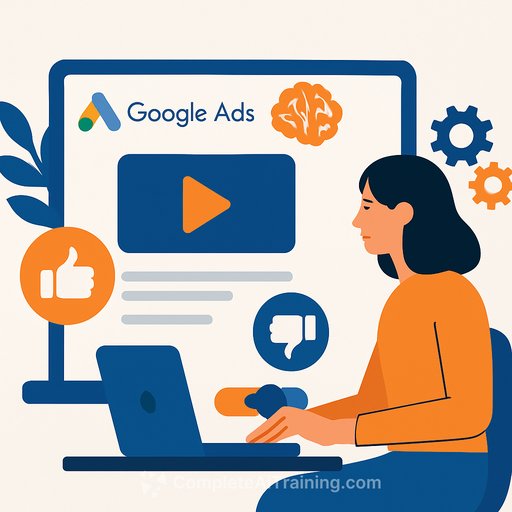When to Trust Google Ads AI—and When Not To
Google Ads now runs largely on AI. This can either boost your ROI or drain your budget. The challenge is knowing when to lean on Google's automation and when to take back control.
Some AI features are reliable and improve efficiency. Others create blind spots that can cost you money. This article lays out a clear framework for deciding which Google Ads AI tools deserve your trust—and which require careful oversight.
How Google Ads Became an AI-First Platform
Google Ads has shifted from manual bidding and full control to a platform driven by AI and machine learning. This brings scale and efficiency but asks advertisers to trust a largely opaque system.
PPC experts emphasize the need to balance AI’s advantages with human judgment. AI alone can’t replace an experienced marketer’s strategic insight. Blindly trusting AI often leads to wasted spend and missed opportunities.
Ask yourself: Are Google’s AI-driven recommendations truly aligned with your goals, or are they nudging you to spend more? The answer lies in understanding the nuances of each AI feature.
High-Trust Automation: Mostly Set-and-Forget Features
These AI tools are generally reliable, grounded in solid data, and aligned with clear advertiser goals.
Automated Bidding Strategies
Smart Bidding strategies like Maximize Conversions, Target CPA, and Target ROAS optimize bids at auction time using thousands of signals a human can’t process instantly.
- When to trust: Use when you have at least 30 conversions in the last 30 days and a clear performance goal. These strategies maximize results within your budget.
- When not to trust: Avoid on brand-new campaigns or accounts with low conversion volume. The AI needs a learning phase and enough data.
- Use caution: In industries with volatile auctions or long conversion cycles—like legal or emergency home services—manual or hybrid bidding may be better. Large budget swings or rare high-value conversions can confuse AI optimization.
Automated Rules and Scripts
These are custom automations created by you, not AI-driven like Smart Bidding. Since you set parameters, you retain full control.
- When to trust: Always. You control triggers and actions.
- Double-check: Review run logs regularly to catch setup errors or platform glitches that can cause unexpected behavior.
Moderate-Trust Automation: Use With Caution
These AI features can help but often need monitoring to avoid unintended results.
Recommendations and Auto-Apply
The Recommendations tab offers suggestions that can improve your account, but many aim to increase spend.
- Trust: For data-backed fixes like repairing broken URLs or removing duplicate keywords—but only after manual review.
- Don’t trust: Avoid broad suggestions like “Add broad match keywords” and never use auto-apply, which changes your account without review.
Responsive Search Ads (RSAs)
RSAs mix your headlines and descriptions to find the best-performing combinations automatically.
- Trust: Great for testing and discovering winning ad copy combinations.
- Don’t trust: If strict brand messaging or legal disclaimers require fixed ad copy order, avoid unpinned RSAs.
Automated Ad Assets
Google auto-generates assets like sitelinks and callouts from your landing page content.
- Trust: Useful for simple businesses needing quick info additions to ads.
- Don’t trust: Regularly review these assets to avoid irrelevant or misleading content pulled from your site.
Nuanced Automation: Test and Monitor
These tools offer powerful automation but require strategic experimentation and close tracking.
Dynamic Search Ads (DSAs)
DSAs automatically generate headlines and pick landing pages based on your website. You can control targeting with URL rules and negative keywords to keep them focused.
- Trust: Use DSAs for keyword discovery and isolate them with their own budget to avoid uncontrolled spend.
- Don’t trust: Avoid on small, static sites or where brand messaging is strict, as irrelevant ads can waste budget.
AI Max for Search
This opt-in feature uses site content to find new queries and expands keywords with broad match.
- Trust: Test on new campaigns. Transparency in reporting makes it a useful tool for uncovering incremental search volume.
- Don’t trust: Avoid applying to your best-performing campaigns immediately; it changes keyword behavior and can disrupt results.
AI Image and Video Creation
Google’s AI can generate visual assets from text prompts.
- Trust: Use cautiously for non-branded, commodity products where brand consistency is less critical.
- Don’t trust: Avoid for brand-specific visuals, logos, or services requiring tight visual control. There are also copyright risks involved.
Ecommerce Automation: The Feed Is King
For ecommerce, the quality of your product feed in Google Merchant Center determines how well AI performs.
Product Feeds (High Trust)
A clean, comprehensive, and up-to-date product feed ensures Google’s automation works as intended.
Automated Feed Updates (Moderate Trust)
Google can update price and availability from your website’s structured data.
- Trust: Use as a safety net to catch real-time discrepancies.
- Don’t trust: Don’t rely on it as your primary feed update method; it can introduce errors if used alone.
Low-Trust Automation: Proceed with Extreme Caution
These black-box features offer little control and transparency in exchange for Google's promise of better performance.
Performance Max Campaigns
Performance Max runs ads across all Google channels with minimal insight into what’s working.
- Trust: Works for ecommerce or lead gen accounts with solid conversion tracking. Best as a supplement to core search campaigns.
- Don’t trust: Avoid if you need granular control or have limited budget. Without reliable conversion data, it may optimize for low-value leads.
Smart Campaigns
Designed for new advertisers with minimal control and reporting.
- Trust: Not recommended for professionals or serious advertisers.
- Don’t trust: These campaigns limit your ability to track performance or prove ROI.
Inherent Limitations of AI
Google’s AI operates within the data and objectives it's given but lacks business context and strategic foresight.
- Lack of business context: AI doesn’t understand profit margins, inventory, or broader goals unless explicitly provided.
- Dependence on historical data: AI struggles with new products or sudden market shifts.
- Potential for misinterpretation: Without value-based constraints, AI may optimize for low-quality conversions.
Why AI Still Needs You
Paid search success comes from collaboration between AI and human judgment.
Let AI handle repetitive tasks and scale, but add business context, set guardrails, and anticipate consequences. Know when to trust AI and when to question it. This balanced approach avoids wasted spend and keeps your campaigns aligned with your goals.
For marketers ready to deepen their AI knowledge and skills, exploring specialized AI courses can provide practical, hands-on training to stay ahead. Consider visiting Complete AI Training for up-to-date courses designed for marketing professionals.
Your membership also unlocks:






